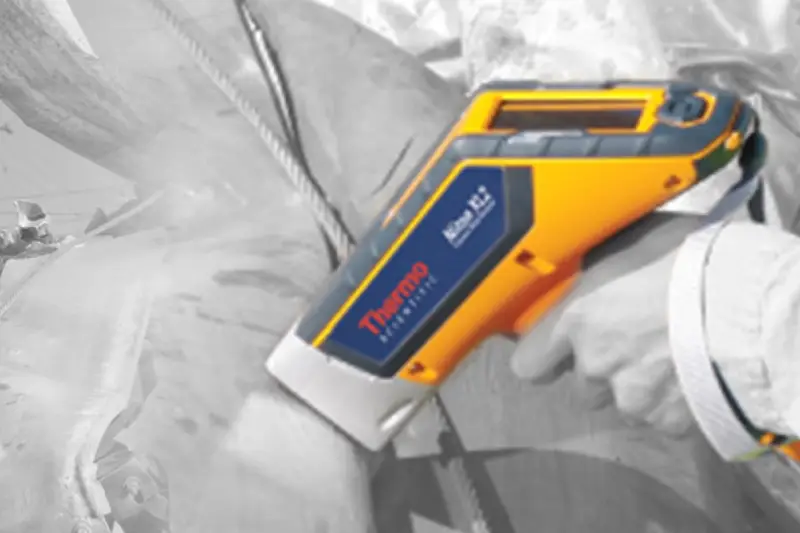
In modern industries where precision, safety, and compliance are essential, Positive Material Identification (PMI) plays a critical role. The PMI machine is a fast and non-destructive testing (NDT) tool used to verify the chemical composition of metals and alloys. This process ensures that the materials used in manufacturing meet the required specifications and standards. Using advanced technologies like handheld X-ray fluorescence (XRF), Positive Material Identification provides reliable results on-site, in laboratories, or directly on the production floor.
What is Positive Material Identification (PMI)?
Positive Material Identification (PMI) is an advanced non-destructive testing technique that determines the exact chemical composition of metallic materials. The PMI machine identifies key alloying elements and verifies whether the metal meets required standards for corrosion resistance, strength, and durability.
PMI testing is essential in industries such as oil and gas, power generation, chemical processing, pharmaceuticals, aerospace, nuclear, and metal fabrication. It ensures that supplied materials conform to the correct specifications before being used in production or during maintenance checks.
The PMI machine can be used for both pre-service inspection of raw materials and post-service analysis of finished or in-service components. From large industrial parts to tiny welds and fasteners, Positive Material Identification ensures that every material used is accurate, safe, and reliable.
How the PMI Machine Works
The most common method of Positive Material Identification uses handheld X-ray fluorescence (XRF) technology. This PMI machine works by emitting X-rays onto the surface of the material, which excites its atoms and produces a unique fluorescent signal. This signal is analyzed by the instrument’s software to determine the elemental composition and alloy grade.
Because the PMI machine is portable and easy to operate, it can be used in various environments—whether on the factory floor, construction site, or laboratory. The process is quick, cost-effective, and entirely non-destructive, making Positive Material Identification a preferred choice for quality control teams worldwide.
Importance of Positive Material Identification
One of the primary causes of industrial failure is the use of incorrect materials. When the wrong metal or alloy is used, it can lead to mechanical failures, corrosion, or system breakdowns. The PMI machine helps eliminate such risks by confirming material accuracy before use.
Positive Material Identification plays a vital role in:
- Ensuring the correct alloy grade is used in critical parts and welds
- Verifying that materials meet international standards and safety codes
- Preventing mix-ups between similar-looking metals
- Supporting failure analysis investigations
- Ensuring regulatory compliance and reducing liability risks
In industries like oil and gas or power generation, even a small material error can lead to catastrophic results. Regular testing with a PMI machine ensures reliability, safety, and continuous production without costly shutdowns.
Recommended Practices and Standards for PMI
To maintain consistency and accuracy, Positive Material Identification follows several international standards and guidelines. The American Petroleum Institute (API RP 578) provides a recommended practice for verifying alloy piping systems and components in both new and existing installations.
Similarly, ASTM E1476 – the Standard Guide for Metals Identification, Grade Verification, and Sorting – outlines proper methods and procedures for using a PMI machine. These standards ensure that Positive Material Identification is performed accurately and in compliance with industry best practices.
Applications of Positive Material Identification
The PMI machine and Positive Material Identification are widely used across industries for multiple purposes, including:
- Verifying that products and components are made from the correct alloy
- Detecting mixed-up materials and preventing contamination
- Confirming welds are made with the right filler material
- Conducting failure analysis to determine the root cause of breakdowns
- Ensuring compliance with safety and government regulations
- Documenting material verification for traceability and quality assurance
With these capabilities, the PMI machine has become an integral part of modern quality management systems.
Automation in Positive Material Identification
The automation of Positive Material Identification and non-destructive testing (NDT) is transforming the alloy production industry. Automated PMI machines can be integrated directly into production lines for continuous quality checks during material processing.
Advanced systems like the Bruker XMS are designed for automated industrial use. These PMI machines integrate seamlessly into manufacturing and inspection systems through industrial connectors and protocols. Automated Positive Material Identification improves efficiency, reduces human error, and ensures that every batch of alloy meets stringent quality standards.
The PMI machine and Positive Material Identification method are indispensable for ensuring safety, compliance, and quality in metal manufacturing and processing industries. With its fast, accurate, and non-destructive testing capabilities, Positive Material Identification prevents costly failures and ensures that every material used is verified and certified.
As technology continues to evolve, automated PMI machines are setting new standards in material verification—offering precision, reliability, and efficiency for industries that can’t afford to compromise on quality.


